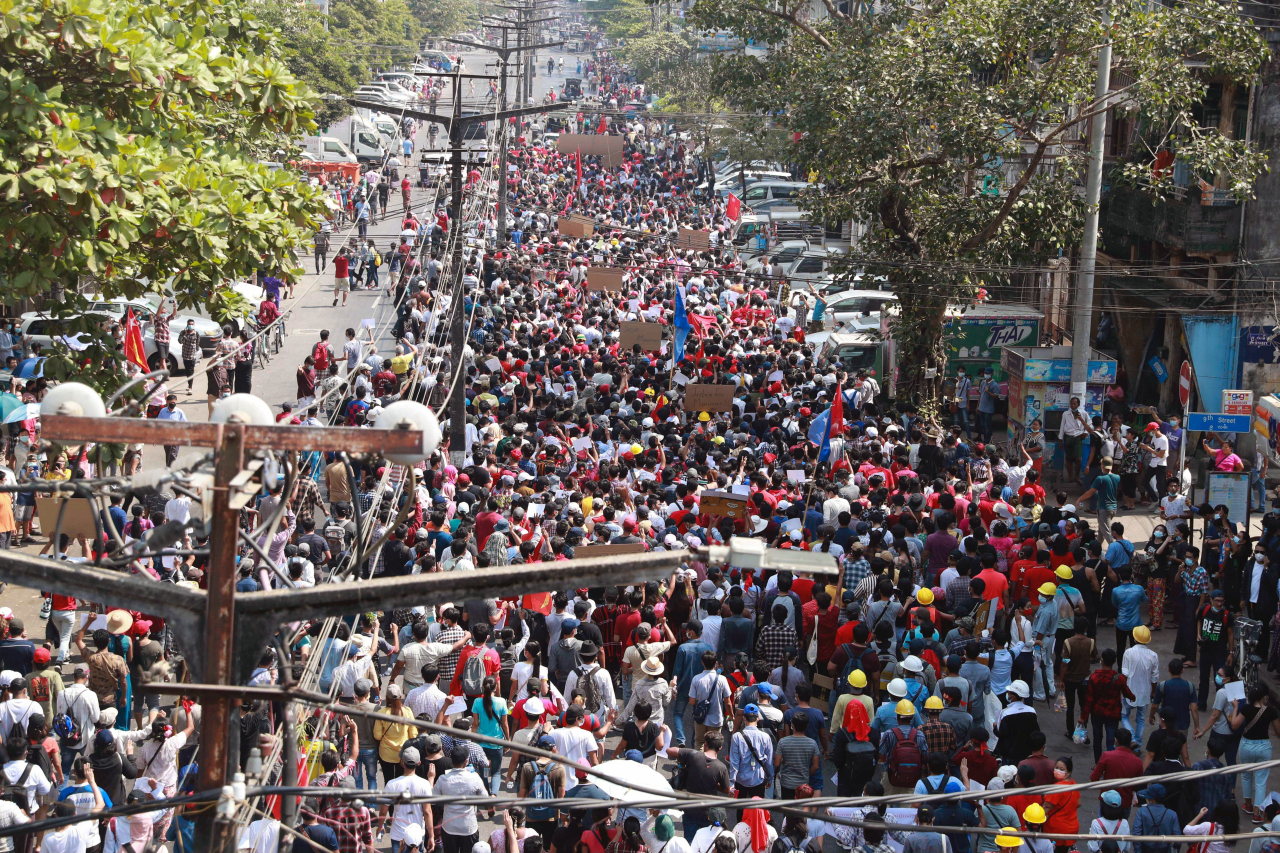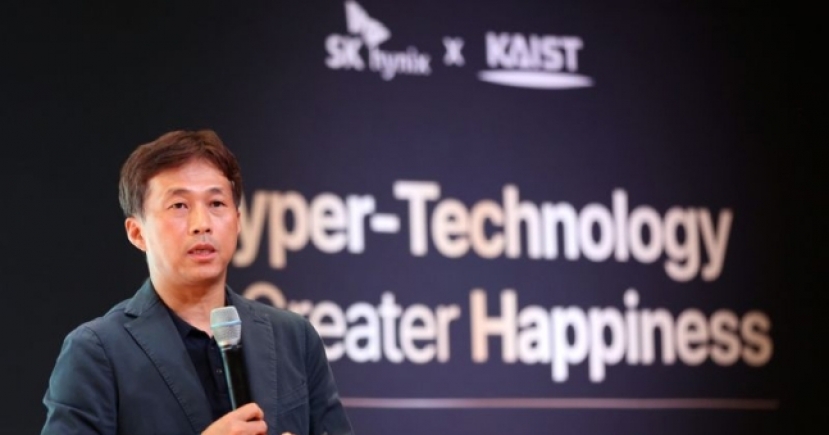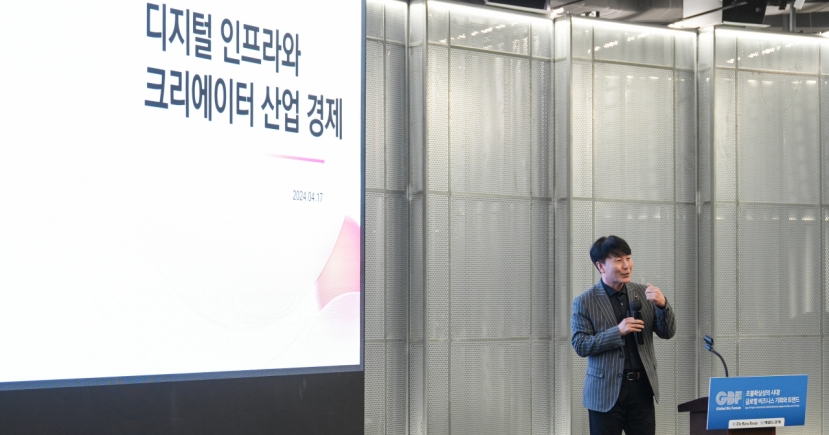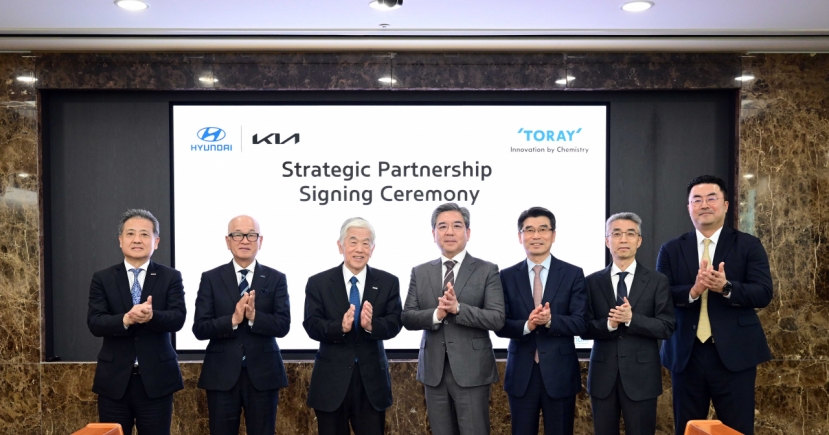Market Now
[Exclusive] Shinhan, Hana accused of indirectly financing Myanmar military businesses
 |
Protesters march towards the direction of Sule Pagoda in Yangon, Myanmar on Feb. 7. (AP-Yonhap) |
South Korea’s leading banks, Shinhan and Hana, have indirectly provided loans and investments to firms with links to Myanmar’s military, data exclusively obtained by The Korea Herald showed on March 25.
In September 2019, Shinhan Bank’s branch in Yangon, Myanmar’s largest city, issued loans worth 847 million won ($750,000) to Myanmar Posco C&C. The coated steel company was jointly established by Posco Group’s steel sheet-making arm Posco C&C and Myanmar Economic Holdings (MEHL), one of two military-owned conglomerates, according to data from activist group Justice for Myanmar. The other is Myanmar Economic Corporation.
Myanmar Posco C&C was established in 2013, following the two companies’ first joint venture Myanmar Posco Steel, a steelmaking company, founded in 1997. The military-controlled MEHL has a 30 percent stake in each firm, it said.
“Any Korean bank that provided loans to Posco is at risk of supporting Posco’s complicity in serious human rights violations in Myanmar,” said Yadanar Maung, a Justice for Myanmar spokesperson.
“Shinhan Bank’s loan to the Myanmar military joint venture in 2019 was egregious. We call on the bank to cut any other possible ties with the military-related businesses, which finance atrocity crimes in Myanmar.”
Posco Group admitted that its Myanmar Posco C&C received loans from Shinhan Bank that year. Shinhan bank declined to comment on the issue, only confirming that the loan was repaid in May last year.
The civic group also voiced criticism against Hana Bank, which has maintained financial ties with the Bank for Investment and Development of Vietnam, the largest state-owned bank in the country in terms of asset size. The Vietnamese state bank directly finances a military-affiliated telecom operator in Myanmar called Mytel, the group claimed. Hana officials in Seoul were not available to comment as of press time.
Mytel is a joint venture between Star High Company, a subsidiary of junta-owned group Myanmar Economic Corporation and Viettel, which is owned by Vietnam’s National Defense Ministry. Star High Company has a 28 percent stake in the telecoms carrier.
In July 2018, the BIDV provided loans worth $11.5 million to Mytel, which were agreed to be paid in a total of nine installments starting June this year until 2023, data showed.
To speed up its expansion in Vietnam, Hana Bank had acquired 15 percent of the BIDV’s shares worth 1.01 trillion won in November 2019, becoming the second-largest shareholder.
“(Justice for Myanmar) calls on Hana Bank, the biggest foreign shareholder in BIDV, to use its leverage to ensure the BIDV cuts ties with the military-controlled mobile operator Mytel,” Maung said.
The activist group noted that Korean banks’ financial ties with the military-linked entities contradict their recent drives to foster ESG management, which focuses on corporation’s impacts on environment, society and governance issues.
“South Korean banks’ ESG commitments must be put into action in relation to loans to Posco and military businesses,” Maung said.
“Otherwise, they will meet with results that are far off from positive social impacts the banks have been claiming to strive for.”
Lenders in dilemma
The claim by Justice for Myanmar puts local lenders in dilemma as they have been seeking ways to expand their operations in Southeast Asian countries while placing ESG agendas as the top priority for their future growth.
Experts say it is almost impossible for local lenders to predict unexpected events, like the Myanmar coup as the transactions took place prior to the forced takeover on Feb. 1. But such political unpredictability should also be considered when making decisions based on ESG values in the future, they said.
“(Shinhan Bank) issued loans to the military-related conglomerate before the coup broke out last month and the loans were already repaid, so it’s difficult to say it was intended to finance the Myanmar military accused of committing crimes against humanity,” said Kim Woo-chan, a finance professor at Korea University.
However, Shinhan’s transaction somewhat contradicts the lender’s ESG commitment to create greater social value, Kim said.
“Since a growing number of domestic banks are fostering ESG management and promoting their image as an ESG-oriented company, there is a great need for preemptive measures to take a closer look at social risks such as anti-democracy values or violation of human rights when deciding whether to lend money to local and foreign corporate borrowers.”
To support the nation’s transition toward a sustainable economy, financial circles have been ramping up their ESG initiatives in the wake of the prolonged COVID-19 pandemic.
Since 2017, financial behemoth Shinhan Financial Group has provided 16 trillion won through loans and direct investment to back companies in green sectors, while recently becoming the first Asian financial holding firm to join the nonprofit Value Balancing Alliance in Frankfurt, Germany, a cross-industry organization developing a valuation standard for monetizing impacts of ESG management.
Meanwhile, under the goal of achieving “coal-free finance,” Hana Financial Group is slated to launch an internal committee in charge of halting financial support for companies bearing ESG-related risks, as early as during the first half of this year.
“Currently, ESG practices remain at an early stage of development across industries and financial circles seem to place a higher emphasis on environmental issues than social and governance problems. They need to monitor their businesses’ social impacts at home and abroad more closely, even though it is hard to comply with all the three ESG values in the short term,” Kim said.
Established in April last year, Justice for Myanmar is a covert group of activists which publishes cases of alleged corruption by the Myanmar military and ties between military businesses and reported human rights violations.
By Choi Jae-hee (cjh@heraldcorp.com)








